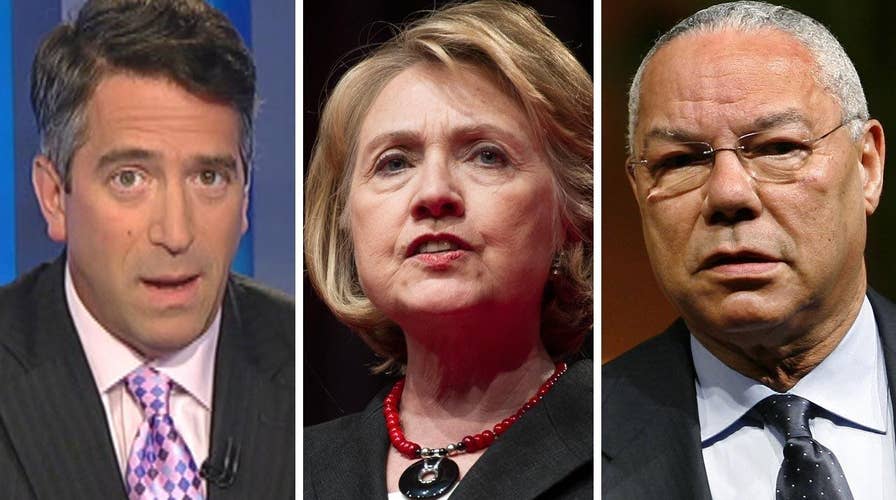Rosen's take: Powell advising Clinton on emails
Chief Washington correspondent James Rosen dissects the release of Colin Powell-Hillary Clinton exchanges on how he advised her on email use, plus a report that the Clinton Foundation deceived the IRS
The top Democrat on the House committee investigating Democratic presidential candidate Hillary Clinton's use of a private email system released an email exchange Wednesday between former Secretary of State Colin Powell and Clinton in which he advised her on circumventing State Department servers.
The exchange between Clinton and Powell, two days before the start of her tenure as secretary of state, shows Clinton asked him for advice on the use of a BlackBerry. He responded with multiple tips, saying he used a personal computer for government and personal business that wasn’t “going through the State Department servers.”
Powell said, “I even used it to do business with some foreign leaders and some of the senior folks in the Department on their personal email accounts."
The emails were cited in the FBI’s notes from their investigation into Clinton’s and her aides’ handling of classified information during her time at the State Department. According to The Wall Street Journal, the FBI quoted some, but not all, of the conversations between Powell and Clinton.
Clinton has told federal authorities she didn’t follow Powell’s guidance, even though she used a private email account to handle government business. FBI Director James Comey recommended no charges be brought against Clinton, but said that she had been “extremely careless” with classified information.
What exactly Powell advised Clinton to do had been a matter of debate, and Powell even recently suggested Clinton’s allies were trying to pin the controversy on him. Democrats released the full exchange in a bid to show that Clinton’s predecessors did not use official email accounts.
In his Jan. 23, 2009, response to Clinton, Powell said he used a “personal computer” and a PDA.
The latest release appears to show that Powell acknowledged he exchanged work-related emails with foreign leaders and State Department officials using a personal device. He said the setup allowed him to “bypass the government’s computer network.”
Powell, in a statement issued Thursday, noted that Clinton has already said she was not influenced by his email.
“I was not trying to influence her but just to explain what I had done eight years earlier to begin the transformation of the State Department's information system,” he said, adding: “I have been interviewed by the State Department IG and the FBI about my actions and decisions. I stand by my decisions and I am fully accountable."
The release of the email by Rep. Elijah Cummings, D-Md. came on the eve of a House Oversight hearing in which Republicans are expected to focus on Clinton’s use of a private email server and whether the State Department had been forthcoming with Freedom of Information requests.
However, Cummings came down on Republicans accusing lawmakers of holding Clinton to a double standard during the investigation into her private email server.
“If Republicans were truly concerned with transparency, strengthening FOIA, and preserving federal records, they would be attempting to recover Secretary Powell’s emails from AOL, but they have taken no steps to do so despite the fact that this period—including the run-up to the Iraq War—was critical to our nation’s history,” he said.
Clinton has repeatedly said that she has followed in the footsteps of her predecessors in regards to using a private email to handle government business.
Powell has denied encouraging Clinton to use a private email server.
A spokesperson for Powell issued a statement last month, saying he had “no recollection” of an alleged dinner conversation between him and Clinton about using a private email server while in office.
“He did write former Secretary Clinton an email memo describing his use of his personal AOL email account for unclassified messages and how it vastly improved communications within the State Department. At the time there was no equivalent system within the Department.
"He used a secure State computer on his desk to manage classified information," the statement added.
As noted by The Wall Street Journal, federal law requires government email exchanges to be preserved for archiving and could be released through FOIA requests. Powell appeared to be aware of that and warned Clinton about using her BlackBerry for government work.
“There is a real danger. If it is public that you have a BlackBerry and it it (sic) government and you are using it, government or not, to do business, it may become an official record and subject to the law... Be very careful. I got around it all by not saying much and not using systems that captured the data.”
Powell also warned Clinton about the possibility of being hacked by foreign agents. He said he had numerous meetings about why he couldn’t bring his BlackBerry into secure areas of the State Department.
The Associated Press contributed to this report.





